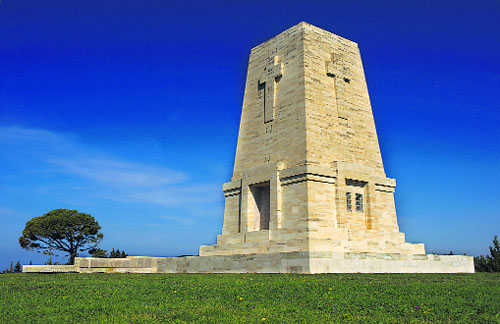COMMEMORATIONS of FirWorld War I, a century ago, began last year will continue for some time. It will be a hundred years in April, 2015 after the disastrous campaign fought in the Gallipoli Peninsula, between Turkey and the Allied powers led by United Kingdom. World War I was termed the Great War as much for the size of the forces which fought in it as for the carnage and costs to victors and vanquished alike. Gallipoli was a side show of the war but became a campaign marked by the valour and sacrifices of the troops, mainly from Australia, New Zealand, France and UK as also of Turkish army led by Kemal Ataturk.
It was a costly but wasted campaign away from the great battlefields in Belgium and France which made the Great War famous. It was a campaign initiated by Winston Churchill against military advice. The disastrous campaign led to Churchill resigning from the British cabinet and going into oblivion to command a regiment on the western front. The Great War brought about the breakup of the Ottoman empire but Gallipoli began the emergence of Turkey as a modern state under Ataturk.
A remarkable outcome of the Gallipoli fiasco and its heavy costs in lives, was the new awareness in Australia and New Zealand of their national identity. The two nations began the shift from being mere appendages of Great Britain to becoming states in their own rights. Knowledge of London's misplaced assumptions about its colonies' willingness to bear any costs saw the beginning of demands for a new status for Australia and New Zealand.
April 25, the day the Gallipoli campaign commenced in 1915, became known as the ANZAC Day named after the men of Australia New Zealand Army Corps who fought against impossible odds. Today ANZAC has surpassed Remembrance Day in the emotional upsurge it creates in the antipodes. In Canberra and Wellington, the most impressive war memorials are for the ANZAC in Gallipoli.
Grand Strategy which ruled imperial notions in London in 1914-1915 required that its Russian ally be supported against Germany. The reality was of the belief that a Russian collapse would allow Germany to turn all its military power against France and Britain. Russia could only be supported by opening a supply route from the south, which required capturing the Dardanelles and Constantinople, which meant defeating Turkey which had allied with Germany. Churchill, First Lord of the Admiralty, ambitious and confident as ever, over ruled naval and military advice and carried the argument for a naval offensive. He managed to get old and reconditioned ships and submarines, and even commandeered Turkey's naval ships under renovation in Britain, to form an armada.
London believed that a show of force would be enough to bring down Turkey's resistance. The operation which involved pushing ships and submarines through the narrow Dardanelles straits was akin to a naval version of Charge of the Light Brigade. The operations was a failure with shore -based Turkish guns blazing away at the hapless armada, leading to ships and submarine being destroyed. There was no military or land attack to support the operations.
A stalemate ensued and was followed by a military attack with troops from Australia, New Zealand, Britain and France and some Indian troops. They attempted to take the heights occupied by Turkish army led by Gen Kemal Ataturk and advised by German generals. It was a long and costly eight months long disaster with 252,000 casualties to the allies and roughly the same numbers of Turkish soldiers. The disdain with which London, and particularly Churchill, viewed the campaign is to be seen in the response to the defeat. When the public became aware of the casualties the media, the cabinet and the Prime Minister turned against Churchill and he was sacked, but led a campaign for more troops to be sent to Gallipoli.
The costs rising in casualties, General Hamilton the commander was asked to plan a withdrawal. Imperial hubris or obstinacy prevailed and he refused. He was replaced by General Munro who on arrival saw the situation and ordered a withdrawal. Churchill, protagonist of military offensives, fumed and said of Munro, “He came, he saw, he capitulated.” Not long after that Russia collapsed, the Tsar abdicated and communist rule began in Moscow. Germany was able to turn its full military power to the western front and by 1918 was near Paris.
Churchill soldiered on with his Regiment in France, and worked his way back into British politics after the War. He went on to become Prime Minister and benchmarked his place in history by leading the allies to a stupendous victory in World War II, in 1945. Kemal Ataturk rebuilt Turkey from the ashes of the Ottoman Empire. He paid the soldier's fine compliment to allied troops who had perished in Gallipoli with his words, “You, the Mothers who sent their sons from far away countries wipe your tears.... your sons are now lying in our bosoms, and having lost their lives on this land they have become our sons as well.” ANZAC Day commemorates the sacrifices made in a pointless military campaign.
The writer is a retired Lt General
Unlock Exclusive Insights with The Tribune Premium
Take your experience further with Premium access.
Thought-provoking Opinions, Expert Analysis, In-depth Insights and other Member Only Benefits
Already a Member? Sign In Now










